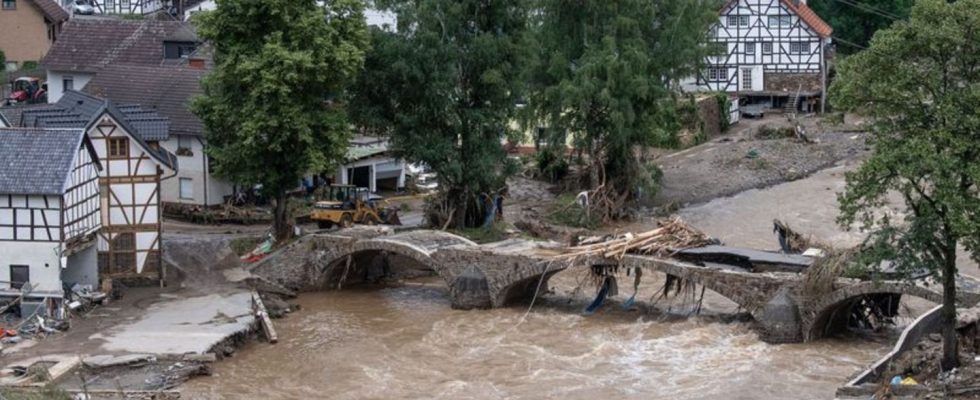After their agreement in the budget dispute, the traffic light leaders initially appeared quite buttoned up. Now for the first time there is a list of their decisions. But changes cannot be ruled out.
Almost a week after the traffic light leaders agreed in the budget crisis, the federal government presented a list of cuts on Tuesday. The federal cabinet is expected to approve it on Wednesday, but some compromises are still politically controversial. Parliament could therefore make changes before the planned Bundestag resolution of the budget for 2024 at the end of January.
According to the Karlsruhe budget ruling, savings of around 17 billion euros were necessary in the core budget. The plan for the Climate and Transformation Fund (KTF) with billions of investments in the modernization of the economy also had to be revised. Ultimately, there was a financing gap of almost 30 billion euros, said government spokesman Steffen Hebestreit.
A solution can be achieved through the abolition of climate-damaging subsidies, through lower spending by ministries, better integration of refugees into the labor market and the reduction of federal subsidies. The most important decisions at a glance:
Subsidies are being eliminated
– Tax relief for farmers will no longer apply: vehicle tax will be due in the future for vehicles used in agriculture and forestry. This should bring additional income of 480 million euros. The abolition of tax relief for agricultural diesel is expected to bring in a further 440 million euros.
– Higher ticket tax when flying: The aviation tax will be increased. In addition, a reduction mechanism is to be abolished that takes effect if revenue from emissions trading for aviation increases. Together, this should bring in up to 650 million euros next year.
– Companies should pay the plastic levy themselves: So far, the federal government has paid a plastic levy to the EU; in the future, the manufacturers will have to pay this themselves. This should bring additional income of 1.4 billion euros.
Ministries have to save money
– Less money for international engagement: A total of 800 million euros will be cut from the budgets of the Foreign Office, the Ministry of Economic Affairs and the Ministry of Development. The Ministry of Transport has to contribute 380 million euros and the Ministry of Education 200 million.
– Less federal subsidy for pensions: The statutory pension insurance receives 600 million euros less from the federal government. At the same time, a pension level of 48 percent is to be guaranteed until 2039. The pension level indicates what percentage of the current average wage someone who has always worked and paid contributions at the average wage for exactly 45 years receives as a pension.
– Employment agency pays back money: The Federal Employment Agency is supposed to pay back 1.5 billion euros to the federal government that flowed as a subsidy during the Corona crisis.
– Rebooking of weapons purchases: The Bundeswehr purchases weapons that were transferred to Ukraine from its own stocks. This is now not financed from the federal budget, but from the special fund for the strengthening of the Bundeswehr. This results in 520 million euros less spending in the budget.
More people in work
– Cuts in citizens’ money: With citizens’ money, bonus payments for further training will be eliminated, and there should also be sanctions for total refusers. According to information from the Ministry of Finance, this brings 250 million euros.
– Job boost for refugees: We want to achieve more when integrating refugees into the job market. This includes more frequent contact and sanctions for breaches of duty. The federal government expects that this will save around 500 million euros.
Cuts in the climate and transformation fund
– The program spending of the special fund for climate protection will be reduced by 12.7 billion euros. Among other things, subsidy programs would be abolished where products had established themselves on the market, it was said across the board. At the weekend, the Ministry of Economic Affairs announced the end of the environmental bonus for electric cars. In addition, a 5.5 billion euro subsidy to reduce network fees for the electricity network will no longer apply.
– Higher CO2 prices for refueling and heating: This should ensure more income for the KTF. At the turn of the year, the CO2 price for heating oil, gas and fuel will now rise to 45 euros per tonne of CO2 instead of 40 euros.
– Equity increase for the railway: So that the railway can make urgently needed investments despite the cuts in the KTF, its equity capital is to be increased by up to 20 billion euros over the next few years.
– Less money for the states: The federal government is cutting 350 million euros in the regionalization funds that the federal states receive to finance rail transport.
Update of forecasts and the debt brake
The federal government is saving several billion euros in the new budget simply because forecasts are becoming more realistic. It is now assumed that interest expenses will be reduced by 2.3 billion euros. In addition, the federal government is dipping around 3.2 billion euros deeper than planned into a reserve that was accumulated during the refugee crisis.
But all of this doesn’t close the billion-dollar hole. The federal government therefore wants to check whether it can also suspend the debt brake in 2024. The first issue is 2.7 billion euros in flood aid for victims of the flood disaster in the Ahr Valley. However, the federal government wants to have a suspension decision checked as legally as watertight as possible beforehand. The question: Does the emergency required by the Basic Law really exist? The traffic light coalition also wants to talk to the Union about whether it would support a suspension or sue again.
The debt brake could also be suspended later in the year – namely if significantly more money is needed to support Ukraine than is currently foreseeable.

